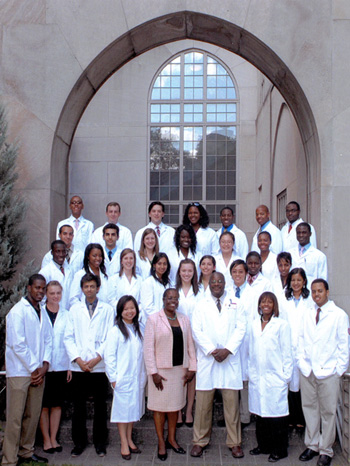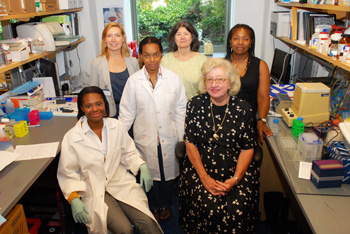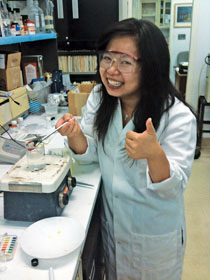Weill Cornell program gives two dozen college juniors research experience -- and passion
For more than 40 years, a summer fellowship program at Weill Cornell Medical College (WCMC) has given premedical college students not just a solid research experience, but also a crash course on the severe disparities in health care among racial and ethnic minorities.

The Travelers Summer Research Fellowship Program at Weill Cornell Medical College gave 25 college juniors a seven-week research experience that also focuses on health care disparities.
The seven-week program began in 1969, initially recruiting students from historically black colleges to give minority students the research experience they needed to become competitive medical school applicants; it has since opened up to all students, but its focus on disparities remains.
Now endowed by Travelers Insurance for the past two decades, the Travelers Summer Research Fellowship Program admits 25 pre-med college juniors each summer, covering all expenses (plus a $140-per-week stipend) and housing the students on campus.
"Students get energized when they come to this program, particularly [about] disparities," said Carlyle H. Miller, the program's director, a WCMC assistant professor of medicine and associate dean for student affairs and equal opportunity programs. "That's a big draw … realizing that something can be done about it, that there are parameters that can be changed: education and jobs and other things, that really feed into health. The students find that fascinating. That may be this program's success."
Weill Cornell had admitted only five African-American students in its history before the start of this program, he said, primarily because minority student applicants didn't have research experience.
James Curtis, a WCMC associate dean in 1969, began the summer research fellowship program with 10 students from Hampton University, a historically black college in Virginia.

Travelers fellows spend most of each week with Weill Cornell researchers, some doing clinical research and others working in laboratories. Jamie Robinson, a Travelers fellow in this summer's program (and now in her senior year at Syracuse University), seated at left, worked in the lab of professor Mary Jeanne Kreek, seated at right.
"They did extraordinarily well, and nearly all those students were [later] admitted to Weill Cornell and ended up in the Class of '74," Miller said.
Miller himself is an alumnus of the program, coming to Weill Cornell in the summer of 1970.
"Once you have a critical mass of minorities in the school, you start getting the applications," Miller said. By the 1980s the program opened admission to everyone. "I like that diversity better than when you have just all of one group," Miller said. "It's a much better program now."
The program's strength lies not simply in the diversity of its students or in the research experience, but in its emphasis on teaching about health care disparities and the long-term effects on underserved populations and communities.
"The program affirmed my passion and aspiration to become a physician," said Charles Hannon, a Travelers fellow from this summer who is now a senior at Villanova, who was already interested in studying health care disparities. The program, he said, "was a great opportunity to further explore" the subject. His experience also has prompted him to look further into other specialties, such as primary care, that offer "the unique opportunity to not only improve the health of patients but also to improve the welfare of their surrounding community."

Thy Ho-Pham, at work in Weill Cornell researcher and professor Brij Saxena's lab as part of her Travelers program experience this summer. Ho-Pham is now in her senior year at Xavier University of Louisiana.
Each summer's Travelers fellows spend Tuesday through Friday with WCMC researchers, some doing clinical research and some working in labs. Students are matched up based on their qualifications and their expressed areas of interest.
On Mondays, though, they take a medical school-level course in the morning -- cardiovascular physiology -- and in the afternoons, they hear from minority physicians (many who are alumni of the program), who stress the focus on disparities in health care. The students also visit health care facilities in underserved neighborhoods, getting to know underserved communities and sometimes shadowing doctors on patient visits and visiting Weill Cornell's simulation labs.
"Everything the medical school opens up to its students, it opens up to these students," Miller said.
"The program was at the right medical school, in the right city, and had all the right people that made it the best summer and learning experience ever," said Thy Ho-Pham, now a senior chemistry major at Xavier University of Louisiana. While at Weill Cornell, she worked in professor Brij Saxena's OB/GYN lab in the Department of Reproductive Endocrinology.
"My fellow Travelers were an amazingly talented, intelligent, and kindhearted group of premedical students who shared the same drive and passion for medicine and health as I did," she said. "Because of this program, I took away the most important lesson as a future physician: Regardless of where one comes from or one's background, a great physician is a benevolent and compassionate physician to all of his or her patients."
Hundreds of students have now spent their summers doing pre-med research at Weill Cornell, most of whom went on to medical school or to earn M.D./Ph.D.s.
"A lot of them end up wanting to come here, and a lot of them eventually do come," Miller said, adding that at least a few from each group end up as medical students at WCMC.
Also, a lot of students go through the program, "but they have their goals set on Hopkins or Harvard or Columbia, so they get into our competitor schools as well. We actually make them better candidates."
Some Travelers program alumni
Alumni of Weill Cornell's Travelers Summer Research Fellowship Program include:
- Carla Boutin-Foster, Weill Cornell associate professor of medicine and associate director of WCMC's Center for Multicultural and Minority Health, which targets disparities in underserved populations without equal access to health care.
- J. Emilio Carrillo, Weill Cornell associate professor of clinical public health, a leading health care administrator who is vice president of Community Health Development at NewYork-Presbyterian Hospital and a former president of New York City's Health and Hospitals Corp., a public benefit corporation (and the largest urban health care agency in the United States) that operates the public hospitals and clinics in the city.
- Gary Butts, associate professor of pediatrics, medical education, and community and preventive medicine at Mount Sinai Medical Center and associate dean for multicultural affairs at the Mount Sinai School of Medicine.
- Carol L. Storey-Johnson, Weill Cornell senior associate dean of education.
Links:
Travelers Summer Research Fellowship Program